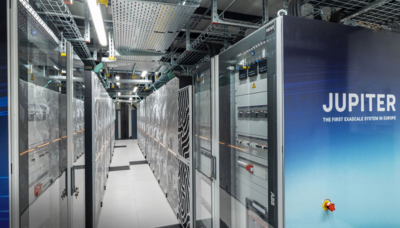ARTICLE AD BOX

It will not be really an exaggeration to say that Europe has been a laggard in technology. There are far and few European technology companies that have a global reach and recognition. It is no different in AI race, which too is dominated by American and Chinese companies. Europe now seems to be aiming to change this. As to how, with its new Supercomputer called Jupiter. The Jupiter supercomputer, Europe's fastest and first exascale system, was officially unveiled on June 5 in Germany. German Chancellor Friedrich Merz stated that this new supercomputer could help Europe "catch up and then keep pace" with AI leaders like the United States and China.Experts see Jupiter as a significant step for Europe in the AI sector, where it has lagged behind the US and China. A recent Stanford University report revealed that in 2024, U.S. institutions produced 40 "notable" AI models, compared to 15 for China and just three for Europe.According to a report by news agency AFP, during the inauguration, Chancellor Merz acknowledged the "neck-and-neck race" between the U.S. and China for AI dominance. However, he emphasized that Europe can still make up ground, stressing the need for "sovereign computing capacities" as a matter of both economic competitiveness and national security.Jupiter was built by a consortium that includes the French tech giant Atos's subsidiary Eviden and the German group ParTec. Despite this, the system's reliance on U.S.-made Nvidia chips highlights Europe's continued dependence on American technology.
What is the Jupiter Supercomputer
Located at the
Juelich Supercomputing Centre
, Jupiter is claimed to be Europe's first "exascale" supercomputer, capable of performing at least one quintillion (one billion billion) calculations per second. The U.S. currently has three such computers.The system is housed in a 3,600-square-meter facility, roughly half the size of a football pitch, and contains about 24,000 Nvidia chips. The project's development and operational costs over the next few years, totaling 500 million euros ($580 million), are being jointly funded by the European Union and Germany.According to Thomas Lippert, head of the Juelich center, Jupiter is "a leap forward in the performance of computing in Europe," being 20 times more powerful than any other computer in Germany. Its immense processing power will be accessible to researchers and companies across various fields, including training AI models.
Apps of Supercomputer Jupiter
Beyond AI, Jupiter has a wide range of applications. Researchers plan to use it to create more accurate and long-term climate forecasts, which could help predict extreme weather events. While current models can simulate climate change over a decade, scientists believe Jupiter will enable them to forecast up to 30 years and possibly even up to 100 years.The supercomputer will also be used to realistically simulate brain processes for research into diseases like Alzheimer's and to optimize clean energy technologies, such as simulating air flows around wind turbines.Jupiter requires an estimated 11 megawatts of power, equivalent to the energy consumption of thousands of homes. However, its operators claim it is the most energy-efficient among the world's fastest computer systems, using advanced hardware and water-cooling systems. The waste heat generated by the computer will also be repurposed to heat nearby buildings.



.png)
.png)
.png)
















 3 days ago
7
3 days ago
7







 English (US) ·
English (US) ·